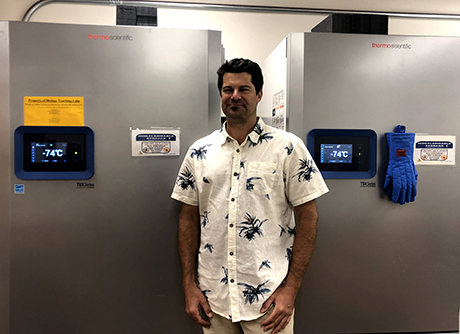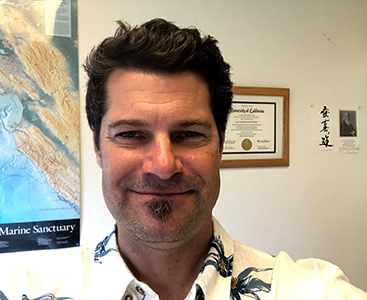Julio Harvey, Biology Teaching Laboratories Manager, is our October 2021 Sustainability Champion. He is being recognized for his tireless commitment to energy saving efforts on our campus which led to him winning an Honorable Mention for the 2020 International Laboratory Freezer Challenge. Read our interview with Julio to learn more.
1. Tell us a bit about yourself, your background, and how your path led to where you are today.
As an undergraduate at UC Berkeley, I spent my junior year abroad studying at Lund University in southern Sweden—the high level of efficiency, social welfare and environmental consciousness, characteristic of that culture, made a lasting impression. My graduate work on the genetics and ecology of marine algae at UC Santa Cruz, and subsequent fisheries conservation work at the University of Washington and the Monterey Bay Aquarium Research Institute (MBARI), served to further fuel my lifelong interest in working toward sustainability. Thanks to contributions from the Division of Physical and Biological Sciences (PBSci), the Molecular, Cell and Developmental Biology Department (MCD), the Ecology and Evolutionary Biology Department (EEB), and partnership with Ellen Vaughan, Elida Erickson, and other members of UCSC’s Sustainability Office, we in the Biology Teaching Laboratories (BTL) have accomplished remarkable energy and water savings in our operations, over a short amount of time.
2. You have been dedicated to improving energy efficiency for many years. Can you tell us about your campus initiatives and projects that you have been involved in that led to so much energy saving?
While I have been dedicated to environmental stewardship for many years, my current career at UC Santa Cruz started relatively recently, in the summer of 2018. Since that time, we have accomplished several noteworthy projects aimed at decreasing UCSC’s carbon footprint. These projects have resulted in the replacement of (in some cases, decades old) ultra-low temperature freezers, refrigerators, and domestic defrosting freezer/refrigerator combos, all of which were extremely energy inefficient. Similarly, we have replaced an entire walk-in cold room with simple deli-case style refrigerators and refrigerated centrifuges, and also replaced a water and energy-hungry industrial glassware washer with a modern, more efficient equivalent. Additionally, we have brought a small fleet of e-bikes to the Ecology and Evolutionary Biology Department at UCSC’s Coastal Sciences Campus, purchased smaller, stand-alone autoclaves to reduce usage of our larger, less efficient unit, in Thimann Laboratories, and replaced all of our compressor-based fruit fly incubators with Peltier element equipped equivalents, greatly improving our operational efficiency while reducing our collective carbon footprint.
3. Tell us about the freeze retrofits you implemented on campus, and what that involved. Feel free to comment on the International Freezer Challenge where you were recognized for your great efforts.
Our first freezer and refrigerator retrofit project would not have been possible without collaboration and funding managed by Sarah Gilchrist (Assistant Energy Manager) and Patrick Testoni (Campus Energy Manager) of Physical Planning, Development & Operations. Thanks to partnership of this group with our Team and UCSC’s Sustainability grant, we were able to replace two ultra-low freezers and multiple 60s era deli-cases, domestic freezer/refrigerators, and other cold storage equipment with modern, non-defrosting equivalents—units that maintain low temperatures and are therefore much more energy efficient than their auto-defrosting counterparts.

One exciting aspect of this project was that we were able to retire more units than we purchased, reducing the overall number of freezers and refrigerators on site. Subsequently, the permanent decommissioning of the second floor walk-in coldroom in Thimann Laboratories, represented a massive energy savings. The function of this walk-in had also become extremely poor over decades of service, resulting in numerous electrical and mechanical issues and potential hazards. When I discovered that this unit was primarily being used for 4 C cold storage and bench-top cold centrifugation, it seemed possible that we could replace it with a few deli-cases and a fleet of refrigerated bench-top centrifuges. Thanks to contributions from the PBSci Division, MCD and the Carbon Fund grant, it was possible to accomplish this goal. As for the Freezer Challenge Award, most credit goes to Ellen Vaughan, who made us aware of the opportunity and worked with us to fund our collective efforts. We replaced so many freezers and refrigerators that it was relatively easy to achieve an impressive result, in terms of energy savings.
4. Utilizing the Carbon Fund grant, you have been able to execute many projects. Can you tell us about the importance of this fund for your work, and specifically, tell us about the incubator project. What is an incubator, the incubator project and can you tell us the savings achieved?
The Carbon Fund grant has been incredibly important for our sustainability work in the BTL—we wouldn’t have been able to accomplish most of our projects without it, so the Fund has been critical for our success. The incubator project has been pretty exciting in that our expectations were greatly exceeded by the actual energy savings benefits for this project.
It is evident that our new Peltier element incubators range in energy use from 1.13–1.98 kWh, dramatically lower than expected. Actual measurements taken from two units, over nine, non-consecutive days, under different ambient temperature conditions (range = 20–27℃) reveal an average energy use of only 1.425 kWh/day. Therefore, our original energy consumption savings projection of 40% increased efficiency was inaccurate: our new incubators use only 6.8% as much energy as the old Percivals, so they are ~93% more efficient!
As you can imagine, this new data has dramatic consequences for our greenhouse gas (GHG) & cost savings calculations. Our new calculations reveal that this project is likely to save approximately 11,685 kWh per year, even though we have upgraded from the originally proposed two to three new incubators. This translates to GHG reductions of 55.62 tons of CO2 emissions over 20 years and a simple payback period of just over 8 years, down from over 12.5 years in our previous projection.
5. You are a big supporter of Green Labs and the Sustainability Office in general. Why is it important for you to show up and participate in these events and be “in the know”?
Green Labs and the Sustainability Office events are a great place to learn about the sustainability issues facing our campus and are also the best way to learn more about grant opportunities aimed at improving sustainability. Without the networking and communications engendered by these events, the rate of project proposal approvals would be reduced and time to delivery of project goals would be significantly increased, in my opinion.
6. What is the most rewarding part of your work?
Honestly, helping to improve our facilities, and ultimately, the experience of UCSCs students, faculty and staff is the most rewarding aspect of my work. Helping the university live up to laudable, UC-wide sustainability goals is an added bonus that can't be overstated.
7. What does Sustainability mean to you?
I would define Sustainability as the art of maintaining a high standard of living on earth. If we degrade our environment, or overpopulate beyond what I would call a Reasonable Carrying Capacity, we risk lowering our standard of living below an acceptable level.
8. Is there anything else about the work you do that you would like to share?
Next steps include upgrading to newer, more efficient autoclaves and other steam powered resources. This work is currently underway.
9. Lastly, what do you do for fun outside of work?
I enjoy surfing, hiking and otherwise spending plenty of time out of doors.

